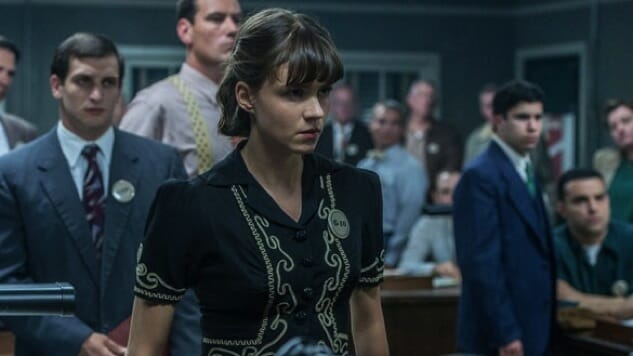Manhattan: “33”
(Episode 2.06)

Much like Mad Men, Manhattan revolves around fictional characters being bombarded by the inevitable, unstoppable force that is history. Unlike Matt Weiner’s prestige drama, however, the show’s characters do not have the benefit of existing in the more conceptually amorphous decade that is the 1960s. No, Frank, Liza, Abby, Charlie et al. are battling against a tide that is perfectly calibrated to bring only destruction and misery to their lives. They’re not only living in a time of war, but also trying to grasp for control in an environment where there is none. As the conclusion to “33” aptly displays—even an inspiring, television-friendly victory is no match against the onslaught of documented history.
But let’s come back to that. “33” mostly exists as an entry to move each storyline forward in incremental installments. Or, in the case of the show’s final scene, a monumental step forward that ultimately results in people slipping and falling on their butts. As expected, Abby’s miscarriage has driven the Isaacs—who were already walking on eggshells—further and further apart. While Charlie finds himself reconnecting with former mistress Helen, Abby becomes suspicious/intrigued with Paul who—based on his enigmatic, undocumented phone calls—she believes has a secret, unscrupulous agenda. That being said, it’s hard to deny that the two have somewhat of a burgeoning In the Mood for Love thing going on, wherein they both are able to bond over the fact that their respective partners (Charlie and Helen) left them to be with each other at one point.
These bits of domestic drama combined with espionage dovetail nicely with Frank’s storyline, wherein he tries to convince all of the Hill’s scientists to unionize in time for when Roosevelt’s scientific advisor Vannevar Bush visits the base. When using Helen as the cause’s mouthpiece proves to be less than effective (in a sign of the times, she recommends getting an inside man who’s “actually on the inside…or a man”), Frank begins circulating a petition. In a passive-aggressive move to get him away from Bush, Charlie orders that Frank be taken to a testing facility on the outskirts of the desert until Bush has completed his inspection. It’s here that, on his way out of the base, our hero sees Fischer’s submerged car being brought in and abruptly finds himself visited by the ghost of his former tormenter.
Between this and The Leftovers, television appears to be having a new renaissance of potentially imaginary friends that literalize the internal discord of its main characters. Given that Frank has had visions before in times of great emotional stress, Fischer’s appearance is not out of the realm of possibility, though I do hope that this indicates a sign of mental deterioration to come as opposed to a one-off excuse to bring Richard Schiff back into the fold (which, to be clear, I would have no actual problem with). Desperate to get his one shot at engaging Bush, Frank eventually decides to expose himself to a massive amount of radiation so that his colleagues have no choice but to take him back to the base for medical evaluation.
-

-

-

-

-

-

-

-

-

-

-

-

-

-

-

-

-

-

-

-

-

-

-

-

-

-

-

-

-

-

-

-

-

-

-

-

-

-

-

-








































